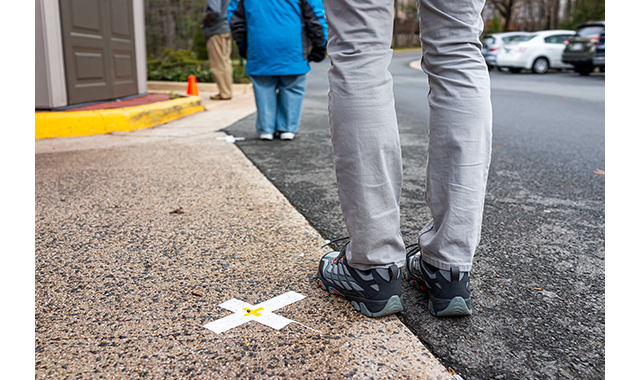- Best Practices New Normal
- Digital Dentistry
- Data Security
- Implants
- Catapult Education
- COVID-19
- Digital Imaging
- Laser Dentistry
- Restorative Dentistry
- Cosmetic Dentistry
- Periodontics
- Oral Care
- Evaluating Dental Materials
- Cement and Adhesives
- Equipment & Supplies
- Ergonomics
- Products
- Dentures
- Infection Control
- Orthodontics
- Technology
- Techniques
- Materials
- Emerging Research
- Pediatric Dentistry
- Endodontics
- Oral-Systemic Health
Control in the time of a pandemic
In a time where everything can feel out of our control, it’s often helpful to focus on what is in our control.

Given current events, there has been a lot of talk about the “new normal,” but it’s hard to say what that means. Is this how we are going to be living our lives in the next couple of months? My short answer is, no. In order for this to be considered “normal,” we have to have some routine or some idea of the future. But we have no idea what is coming next.
Patients are unsure if they should keep their appointments or reschedule. Plus, with social distancing requirements, practices will likely be seeing fewer patients than before. Fewer patients could mean that some practices only return a portion of their staff, at least temporarily. Dentists across the country are wondering how they’ll keep their practices afloat.
It’s obviously difficult to manage a practice without having an idea of when patients will schedule appointments or if staff will come back to work. It creates a lot of undue stress added on top of the fear that already exists in returning to the practice. We hope that the worst has past us, but there’s no way of knowing for sure.
As our economy is reopening, the fact that the coronavirus is still out in full force can be overlooked. As far as we know, there’s been very little change in the status of the pandemic-no vaccine, very little testing-the threat still looms. But, in a time where everything can feel out of our control, it’s often helpful to focus on what is in our control. Here are six small things we should keep doing outside of the practice.
- Wear a mask when you are out of the dental office. Sure, it’s uncomfortable, but this is so much bigger than any of us individually. We need to think about others, and masks protect ourselves as well as those near us. Also, masks should be worn properly, covering your nose and mouth, not around your neck. Fit is important too, so find a brand that works best for you.
- Wash your hands frequently. Hygiene is critical now more than ever. If washing your hands with soap and water isn’t available, use hand sanitizer. The Centers for Disease Control and Prevention suggests using alcohol-based handrub (ABHR) with at least 60 percent ethanol or 70 percent isopropanol. Working in a high-risk industry means you’re more likely to bring the virus home with you. Many practices already have protocols in place, so staff leave scrubs and work shoes in a locker. If not, consider a spot in your home away from your family where you can change out of potentially contaminated clothing, and be sure to wash these items quickly.
- Think carefully before going to public places. Are you putting yourself or others at risk? Follow CDC recommendations and maintain social distancing guidelines set by retailers or other public places. Many have directional arrows in aisles so shoppers can keep a safe distance.
- Teach your kids and elderly parents the importance of social distancing, masks, and washing hands. If mom or dad don’t wash their hands, then chances are, the kids are following your lead.
- Do NOT go to work sick. This is a tricky issue, as many have been out of work for weeks/months and need the paycheck. However, taking Ibuprofen to lower your temperature so you can go to work is putting lives at risk-not just patients and colleagues, but yours as well. I know that is difficult when the paycheck is so very much needed. But remember, this pandemic is bigger than any one person.
- Take care of your own mental health. Since you are now on the front lines of this battle, you need to be more self-aware of how you are doing. If you are a parent, you put your kids first. If you are a caregiver, you put your parent first. But, if you are falling apart from stress, you will not be there for them. Ask for help. Let your family, friends, doctor, counselor, boss, or anyone who will listen know what you are going through. You aren’t alone. Get help sooner rather than later.
In Ohio, our numbers are lower than other states due to an aggressive action on the part of Gov. Mike DeWine and the Ohio Department of Health. Whichever state you live in, be cautious of large gatherings and protect yourself and your family. In turn, you will protect so many more. Follow the science and stay safe.
Study Shows Dental Opioid Prescribing Went Up During COVID-19 Pandemic
November 6th 2023A new study demonstrates that dental opioid prescribing increased during the peak of the COVID-19 pandemic, reinforcing the importance of non-opioid pain management solutions even during global health emergencies.
